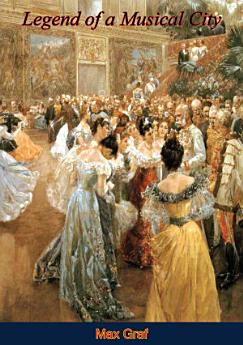Legend of a Musical City
About this ebook
The Nestor of Austrian music critics relates in a fascinating manner his own recollections of life with Bruckner, Brahms, Richard Strauss, and other immortals in the music world. Author, Max Graf, who enjoyed intimate friendships with many of the musical stars of the late 19th and early 20th centuries, here gives a delightful as well as highly educational story of the development of Austrian music.
“Max Graf is not only an eminent historian and teacher, but a very adept writer; as a critic, he has shown keen judgment and objectivity.”—Richard Strauss
About the author
Max Graf (1 October 1873 - 24 June 1958) was an Austrian music historian and musical critic. He also authored a number of critically acclaimed books, including Legend of a Musical City (1945), Composer and Critic: Two Hundred Years of Musical Criticism (1946) and Modern Music: Composers and Music of Our Time (1946). Graf was born in Vienna in 1873, the son of Joseph Graf, a Jewish writer and editor. He was educated in Vienna and Prague and studied at the law school of the University of Vienna from 1891-1896. He devoted much of his time to music composition and criticism, and regularly took part in meetings of the literary group Young Vienna (Jung-Wien). From 1902-1938 Graf taught history of music and musical aesthetics at the Vienna Academy of Music, where he was appointed professor in 1909. Graf met Sigmund Freud in 1900 and, within the psychoanalytic movement, is known for being the father of “Little Hans,” Herbert Graf (1903-1973), having supplied Freud with the material for his paper “The Analysis of a Phobia in a Five-Year Old Boy” (1909). At the end of 1904, Graf took part in sessions of the Wednesday Psychoanalytic Society and, in December 1907, wrote an essay entitled “Methodik der Dichterpsychologie” (Methodology of the Psychology of the Poet). Graf emigrated to the U.S. in 1938 and taught until 1947 at the New School for Social Research in New York, where, in 1940, he created the first seminars in music criticism. He was a guest professor at the Carnegie Institute of Technology in Pittsburgh and at Temple University in Philadelphia. In 1947 he returned to Austria and taught music criticism at the Mozarteum in Salzburg and elsewhere. He was awarded the Prize for Journalism by the City of Vienna (Preis der Stadt Wien für Publizistik) in 1952 and published his autobiography, Jede Stunde war erfüllt: Ein halbes Jahrhundert Musik- und Theaterleben, in 1953 in Vienna, where he died in 1958, aged 84.






